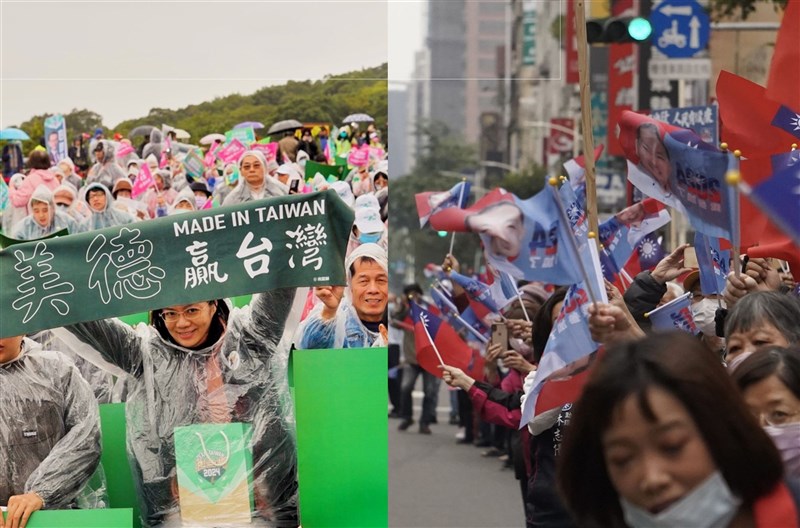DPP, KMT presidential candidates targeted over party cross-strait stances

Taipei, Dec. 28 (CNA) Taiwan People's Party (TPP) presidential candidate Ko Wen-je (柯文哲) took aim at his two opponents for their respective party's independence and unification ideologies at a forum on Thursday, accusing them of using the cross-strait issue to tear society apart.
The ruling Democratic Progressive Party (DPP) maintains a pro-independence clause in its party charter with presidential candidate Lai Ching-te (賴清德) calling himself a "pragmatic worker for Taiwanese independence," Ko said at the televised policy presentation forum.
The former Taipei mayor and TPP chairman was referring to a clause in the DPP Party Platform, which proposes holding a referendum on whether or not to establish the "Republic of Taiwan" as a sovereign state and create a new constitution.
Over the years, the party has maintained the position that the Taiwan independence clause has been superseded by the Resolution on Taiwan's Future in 1999, which states that any change to the status quo -- Taiwan being an independent sovereign nation named the Republic of China (ROC) -- must be determined by its people.
Ko also turned to his Kuomintang (KMT) opponent Hou Yu-ih (侯友宜) and reproached him for accepting the "1992 consensus," saying that it "lacks support from mainstream society," and criticized the party for keeping the pursuit of unification unchanged in its constitution.
Both the DPP and the KMT have held stances that go against their pledges to maintain the status quo, the TPP nominee said, arguing that they have manipulated the independence-unification issue for election gains and torn society apart.
Hou defended himself by saying he has taken a "centrist" position on this issue, in accordance with the Constitution of the Republic of China, rejecting Ko's framing of the KMT as being in favor of unification with China.
The KMT opposes both Taiwanese independence and the "one country, two systems" political formula proposed by Beijing, Hou said, adding that the future of Taiwan should be determined by Taiwan's 23 million people.
"Our relationship with the mainland should be characterized as non-recognition of each other's sovereignty, but non-denial of each other's jurisdiction," he added.

Speaking on diplomacy and defense, Ko on Thursday walked back from the controversial remark he made during an interview a day earlier suggesting the importance of maintaining diplomatic allies was "a myth."
Taiwan does not need its diplomatic allies and should instead focus more on developing practical relations with world powers, such as Japan and the United States, despite a lack of formal diplomatic relations, he had said during the interview.
The comments drew criticism from the Ministry of Foreign Affairs (MOFA) earlier on Thursday, with spokesman Jeff Liu (劉永健) criticizing Ko for "sending the wrong message" to the nation's allies, saying it could "hurt their feelings."
At the forum, Ko said he upholds so-called "practical diplomacy," under which Taiwan focuses on having practical exchanges with allies and non-allies and pays less regard to what name the country uses during these exchanges.
He also proposed that Taiwan ditch its previous "dollar diplomacy," and replace grants awarded to diplomatic allies with loans.
As part of efforts to boost Taiwan's defense capability, Ko said he supports gradually increasing defense spending to 3 percent of the country's gross domestic product and further promoting the domestic defense industry.
Lai, who is currently vice president, responded to Ko by saying that his proposed foreign and defense policies are "nothing new" as they have been steadily implemented by the current administration led by President Tsai Ing-wen (蔡英文).
Lai then pointed the finger at both Ko and Hou, saying that they have blamed the DPP for losing diplomatic allies but failed to reproach Beijing for its poaching activities.
"You two never condemn China's barbaric behavior [in taking away Taiwan's diplomatic allies], and that is the major difference with us [the DPP]," Lai said.
Since Tsai assumed office in May 2016, Taiwan, has lost a total of nine diplomatic allies to China amid deteriorating cross-strait relations. The ROC currently maintains full diplomatic ties with 13 sovereign nations worldwide.
- Society
Taiwan to allow foreign nationals to serve in social work sector: MOL
05/03/2024 12:22 AM - Business
Taiwan's manufacturing industry could be the first to recruit Indian workers
05/03/2024 12:07 AM - Cross-Strait
Taiwan bans its citizens from working for China's Confucius Institutes
05/03/2024 12:01 AM - Business
MOTC rolls out NT$1,000 travel subsidies for Hualien post-quake recovery
05/02/2024 11:12 PM - Cross-Strait
10 PLA aircraft cross Taiwan Strait median line: Defense ministry
05/02/2024 10:39 PM
